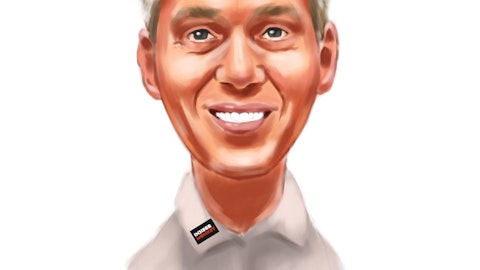Carlo Santarelli: So I’m kind of going to just go along the same lines as David’s prior question, but can’t help but notice, obviously, you guys decided to kind of split out the Nevada taverns from Distributed Gaming. Obviously, more disclosure is more helpful. But strategically, is there anything to the rationale of splitting it out right now? And when you think about the tavern business as a feeder for you guys throughout Nevada, is that maybe a little bit more strategically sensitive than we give a credit for?
Charles Protell: Yes, I think so. Look, I mean, the taverns, I mean, obviously, the portfolio is predominantly in Las Vegas. And if you look at the size and scale of that business, it’s effectively a local — good-sized local casinos that’s complementary to the rest of our portfolio. I mean, we treat them as such. We market to our players as such. We have them integrated with our casino rewards programs. So again, I think from our perspective, I think there’s certainly a difference between the businesses that we control and the businesses that we service for others. We try to do both very, very well. But ultimately, the third-party Distributed business, if you look at a property EBITDA perspective, it’s less than 15% of the overall operations.
It’s important it is, quite frankly, the start of this public company that we have here today. But when you look at the rest of the portfolio, where we see the growth opportunities versus the maintained opportunities, it’s more in the other business units than in — for us — than within our third-party distributed business that sits within the states we’re operating in.
Carlo Santarelli: Great. And then just to rehash the color you provided, it was $30 million on The STRAT project. It was $20 million on the taverns and then that incremental $40 million to $50 million circles back to the kind of regular way maintenance that you’ll spend. Is that accurate to get to that $90 million to $100 million?
Charles Protell: Yes. Yes, that’s right.
Operator: Your next question will come from Cassandra Lee with Jefferies.
Cassandra Lee: Charles, you just said that owning your real estate gives you maximum flexibility. But given the misallocation of valuation between kind of private market, public marketing and kind of the OpCo, PropCo how are you thinking about potentially pursuing sale leaseback?
Charles Protell: Well, right now, we think about it as optionality. I mean I think if you look at us as well as some of our peers, owning your own real estate provides you with the cash flow to actually execute on investing in your own assets, reducing leverage as well as returning capital to shareholders. I think that if we were potentially a larger scale portfolio or we were looking at strategic M&A, where synergies far outstripped the incremental rent increases that you’d see on an annualized basis, that it’d be something that we would be pursuing more earnestly. That being said, I think there’s an ultimate backstop to the value of the company that’s embedded in the underlying real estate. And I think that over time to the extent that we are not able to see the appreciation of the value in our shares from a multiple expansion perspective, it’s something that we will consider more strongly.





